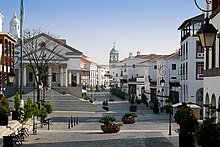
New Classical architecture, New Classicism or Contemporary Classical architecture[1] is a contemporary movement in architecture that continues the practice of Classical architecture. It is sometimes considered the modern continuation of Neoclassical architecture,[2][3][4] even though other styles might be cited as well, such as Gothic, Baroque, Renaissance or even non-Western styles[5] – often referenced and recreated from a postmodern perspective as opposed to being strict revival styles.[6]
The design and construction of buildings in ever-evolving classical styles continued throughout the 20th and 21st centuries, even as modernist and other non-classical theories broke with the classical language of architecture. The new classical movement is also connected to a surge in new traditional architecture, that is crafted according to local building traditions and materials.[7]
- ^ Giuseppe Amoruso, ed. (2018). Putting tradition into practice: heritage, place and design: proceedings of 5th INTBAU International Annual Event. Cham: Springer. ISBN 978-3-319-57937-5. OCLC 1000578629.
- ^ Machalinski, Anne (16 March 2020). "Classical Contemporary Meets the Future". www.mansionglobal.com. Retrieved 2021-01-12.
- ^ Curl, James Stevens (2006). A dictionary of architecture and landscape architecture (2nd ed.). Oxford [England]: Oxford University Press. ISBN 978-0-19-280630-7. OCLC 64585874.
- ^ Curl, James Stevens; Wilson, Susan (2015). "New Classicism". The Oxford Dictionary of Architecture. Oxford University Press. pp. 520–522. ISBN 978-0-19-967498-5.
- ^ "6 Classical Buildings That Are Younger Than You Think". ArchDaily. 2015-04-19. Retrieved 2021-02-18.
- ^ Jencks, Charles (1987). Post Modernism: The New Classicism in Art and Architecture. New York: Rizzoli. pp. 7–8. ISBN 0-85670-867-4.
- ^ Quigley, Kathleen (7 August 2018). "Inside Architecture's New Classicism Boom". Architectural Digest. Retrieved 2019-02-16.